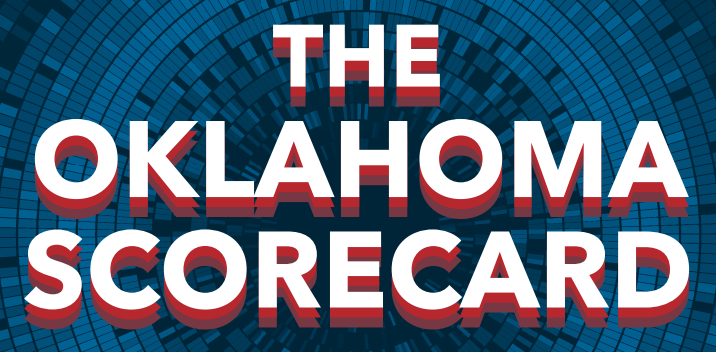OKLAHOMA CITY (OBV) – The State Chamber Research Foundation released its 2024 Oklahoma Scorecard, and the results show that Oklahoma is rising nationally in economic competitiveness.
The Scorecard – released annually by the Research Foundation – evaluates Oklahoma’s competitive position compared to other states across metrics that are highly impactful on economic growth and prosperity. The Research Foundation is the think tank for The State Chamber of Oklahoma and the state’s business community. The Scorecard’s purpose is to help Oklahoma’s policymakers and business community by showing them the areas where the state needs to grow its competitiveness so it can strengthen its economy and become a national leader in business and economic development, according to Lepak.
This year’s Scorecard shows that Oklahoma made significant improvements in economic competitiveness.
Oklahoma rose nine spots in overall economic competitiveness, jumping from 39th in the nation last year to 30th in the 2024 edition.
SCRF Executive Director Ben Lepak attributed Oklahoma’s Scorecard progress to continued improvement in tax competitiveness. Oklahoma’s national tax ranking in the Scorecard improved from 30th to 19th in the last two years, outperforming all but one state in improving tax competitiveness. Lepak’s hope for 2025 is to make it into the top 10.

“We still have a lot of work to do, but we’re seeing really positive progress. I think it’s a testament to why we created the Scorecard in the first place, which is that we can’t really address problems unless we know what the problems are,” Lepak said. “The Scorecard has been a great tool for the business community and for policymakers to prioritize the issues where we need to become more competitive as a state and to target our policy development and research to those variables. It’s encouraging to see Oklahoma’s progress.”
The Scorecard identifies areas where Oklahoma needs to become more competitive and measures specific factors that produce economic growth and prosperity.
The Research Foundation measures variables that have a high impact on the economy’s growth and prosperity for the state, as well as variables that indicate public policy choices, and uses the data to develop policy reforms aimed at improving the metrics that drive economic growth and prosperity. The Scorecard keeps score of the reforms that are implemented, tracking the state’s progress on business competitiveness.
“We rank Oklahoma against the nation, against peer states and against our region. That helps us identify the areas where the state really needs to improve to become more economically competitive. We take that information and then we begin researching policy ideas that will move the needle on those key metrics,” Lepak said. “[That research] is handed off to the business community at large and the State Chamber itself to go advocate for those policy solutions. And then on the back end we measure what kind of success we’ve had.”
This is the third year that the Scorecard has been released. Oklahoma has climbed the Scorecard’s rankings in some of the areas that are key to Oklahoma’s overall competitiveness. Lepak cited Oklahoma’s improved tax competitiveness ranking as a key example.

SCRF partnered with The Tax Foundation in the fall to conduct a study on state tax policy.
“[The Tax Foundation] is the gold standard when it comes to measuring states’ economic competitiveness with regard to taxes,” Lepak said. “We asked them to evaluate Oklahoma’s overall tax system and then to recommend some targeted reforms that we could champion that would improve our standing.”
The report identified a number of essential tax reforms for improving Oklahoma’s competitiveness.
“A number of those reforms that were identified in our report were taken up by the legislature and enacted into law,” Lepak said.
Repealing the state’s franchise tax was one of the suggested reforms.
Last year, the Oklahoma Legislature passed House Bill 1039X, which eliminated the franchise tax. That bill, written by Rep. Gerrid Kendrix, R-Altus, and Sen. Dave Rader, R-Tulsa, automatically became law after it sat unsigned on Gov. Kevin Stitt’s desk for five days.
The franchise tax was a direct tax levied on a company’s net worth, taxing $1.25 for every $1,000 in capital, with the amount capped at $20,000, regardless of the company’s size or net worth.
Lepak also cited the full expensing of capital investments for businesses as a pro-growth tax reform that has raised Oklahoma’s economic competitiveness.
“Oklahoma was the first state in the nation to make that permanent, and that shows up in our improved ranking,” he said.
The elimination of the marriage penalty within the state’s individual income tax was another positive reform, Lepak said.
“With those changes, Oklahoma has moved in just a couple of years from 30th to 19th overall in the country, which is a larger increase or faster increase up the rankings than all but one other state,” he said. “And there are a couple of other targeted tax reforms that would move us from 19th into the top 10, which would be a really significant improvement in the state’s business environment.”
Multiple tax bills have not made it to the governor’s desk, including a comprehensive individual income tax reform bill.
Oklahoma’s individual income tax system has six income tax brackets ranging from 0.5 percent to 4.75 percent for top earners. The 4.75 percent rate kicks in at a $7,000 annual income.
All Oklahomans and more than 95 percent of businesses in the state pay the individual income tax. The income tax’s standard deduction is $6,350 for single filers and $12,200 for joint filers.
The Scorecard also provides national rankings and analysis in the following areas that impact economic competitiveness: workforce, infrastructure, legal climate, government burden and health care.
Oklahoma ranked 42nd nationally in workforce, 12th in infrastructure, 34th in legal climate, 44th in government burden and 44th in health care.
Lepak said the Scorecard brings a business-minded approach to policymaking.
The full 2024 Oklahoma Scorecard can be downloaded on the SCRF website.

















